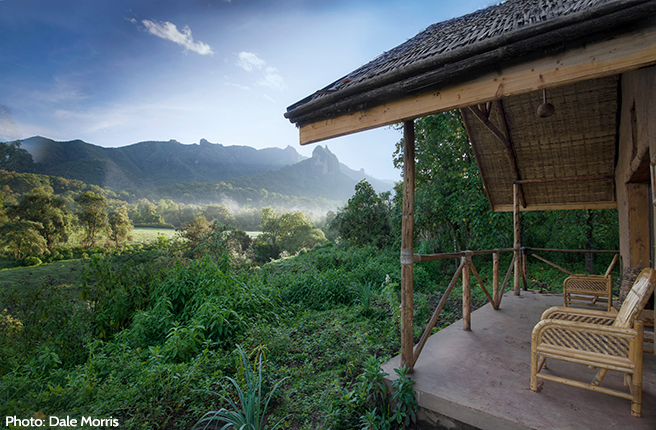Building Conservation Tourism in Ethiopia

Ethiopia’s protected area system covers 14 percent of its land mass, a proportion that is larger than the global average.
Bale Mountains National Park in the south-central part of the country hosts the world’s largest Afro-alpine habitat, 17 endemic mammal species, 57 percent of Ethiopia’s endemic bird species and 60 percent of the remaining Ethiopian wolf population—the world’s rarest canid. It is also a critical water catchment for 12 million people living in the southeastern lowlands and Somalia. Simien Mountains National Park in northern Ethiopia, meanwhile, provides some of the world’s most dramatic high-altitude scenery and is a World Heritage Site. It hosts 21 endangered species and 16 species of birds endemic to Ethiopia and Eritrea.
Despite the latent value of this natural capital, however, Ethiopia’s national park system has not been developed or managed as the significant social and economic asset it could be, due in part to lack of resources and capacity. In practice only two national parks have been formally gazetted, and encroachment has become a considerable threat in a country whose population is approaching 90 million people. The need to demonstrate the economic development potential of these assets, both for local communities and the nation at large, has become an increasing imperative. Over the past couple of years, AWF subsidiary African Wildlife Capital (AWC) has taken a lead in addressing this issue.
Engaging the private sector
AWC was founded by AWF in 2011 as Africa’s first impact-investment vehicle for conservation enterprise. The company provides investment financing to small and midsize enterprises that have the capacity to make a significant conservation and socioeconomic impact, thereby positively engaging the private sector in conservation efforts.
AWC has invested a total of US $2 million to develop the first two ecolodges in Ethiopia’s national park system: Bale Mountain Lodge in Bale Mountains National Park and Limalimo Lodge in Simien Mountains National Park. Both lodges received in excess of US $800,000 in financing from AWC. AWC has also financed the award-winning community-based tourism company, Village Ways, to develop it operations in Ethiopia with an initial focus on the Simien Mountains.
AWC has further worked with the Ethiopian Wildlife Conservation Authority to ensure that global best practices in private-sector concessioning in national park contexts were built into these developments. Demonstrating its ability to innovate, US $200,000 of the AWC funding in Limalimo Lodge was used to create a revenue-based royalty, secured by AWF, to generate an ongoing revenue stream for a new local conservation primary school that AWF is constructing on the edge of the national park. This creates a unique circular symbiosis between conservation, tourism and education in and around a national park.
Continued involvement
Bale Mountain Lodge opened in early 2014. It employs nearly 50 people and generated occupancies of more than 50 percent in its first full year, following extensive international media interest. Limalimo Lodge is currently under construction, with a planned opening in the fourth quarter of 2015, together with five new Village Ways sites in local community villages surrounding Simien Mountains National Park. AWC will continue to remain involved with all three entities and will maintain a presence on the boards of each of these companies. The aim: to work with Ethiopia’s private sector to build on these pioneering developments in nature-based tourism.
